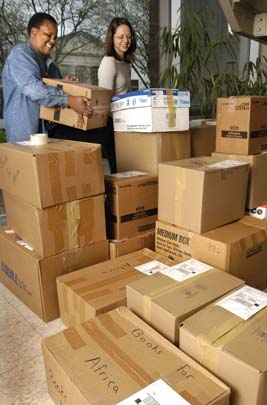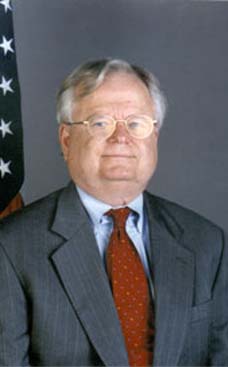
Cleo Lampos has a classroom full of books. On the eve of retirement, she had planned to ship her materials -- accumulated from 26 years of teaching -- to a school library housed in a mud hut with a tin roof in rural southern Africa. Over the last six years, the 4th-grade teacher from Oak Lawn has sent hundreds of books to that school in Malawi, where 30 students share one English language textbook, the Internet doesn't exist and electricity is a part-time service. But last spring, the U.S. Postal Service eliminated some of its international boat mail services, which included an option to send books for a dollar a pound to any country. Hundreds of grass-roots efforts in the Chicago area and across the U.S., many of them through individuals like Lampos, are unsure whether they can continue supporting libraries and other English-language programs around the world. Some say their efforts will be virtually shut down.
Postal rate change has impact around globe
Postal rate change has impact around globe
By Mary Owen | Tribune staff reporter
October 10, 2007
Caption: Njeri Mbugua, assistant professor of sociology (left), and Gita Bazarauskaite '09 at Illinois Wesleyan University prepare cartons of used textbooks for shipment to Africa.
Cleo Lampos has a classroom full of books. On the eve of retirement, she had planned to ship her materials -- accumulated from 26 years of teaching -- to a school library housed in a mud hut with a tin roof in rural southern Africa.
Over the last six years, the 4th-grade teacher from Oak Lawn has sent hundreds of books to that school in Malawi, where 30 students share one English language textbook, the Internet doesn't exist and electricity is a part-time service.
But last spring, the U.S. Postal Service eliminated some of its international boat mail services, which included an option to send books for a dollar a pound to any country.
Hundreds of grass-roots efforts in the Chicago area and across the U.S., many of them through individuals like Lampos, are unsure whether they can continue supporting libraries and other English-language programs around the world. Some say their efforts will be virtually shut down.
"It's going to be a small fortune for me," said Lampos, 61, who teaches at Nathan Hale Intermediate School in Crestwood. "I'm not sure if I can continue sending books."
On May 14, the Postal Service cut international surface mail, which moved packages via ships, to save money, said Yvonne Yoerger, spokeswoman for the Postal Service. Before the change, materials could be mailed in 66-pound-capacity bags, called M-bags, for the special rate of $1 per pound. Now, M-bags can go only via air mail. The domestic book rate also increased in May.
Lampos said she has been sending about 100 pounds of books, ranging in topics from insects to poetry, to Malawi once or twice a year. Now, shipping 100 pounds of books will cost her at least $395 -- or $43.45 for the first 11 pounds and $3.95 for each additional pound.
Yoerger said federal law requires that postal products and services pay for their costs, and international service mail was not. Route limitations of the shipping companies that contracted with the Postal Service often resulted in packages having to be sent via airplane, even though the sender paid the cheaper rate.
"It's not a judgment by the Postal Service on whether these efforts are worthwhile or not," Yoerger said. "We are required to meet our legal mandates."
More than 6,000 people have signed an online petition to restore the service, and activists nationwide have formed the Coalition to Restore Low Rate Shipping for Humanitarian Purposes to lobby for its return, including non-profit groups such as Friends of Malawi Book Project and Books for Israel.
U.S. Rep. Danny Davis (D-Chicago), who is chairman of the Subcommittee on the Federal Workforce, Postal Service and District of Columbia, said he has received calls and e-mails from more than a dozen groups nationwide. Davis said restoring the $1-a-pound book rate is unlikely because the service simply cannot pay for itself.
"I'm personally very empathetic, but I'm saying we're not in a position to make any promises," Davis said Tuesday. "I think it's very noble, but you also have to have a way to pay for the nobility."
Shipped packages comprised only 2.7 percent of all international mailing from the U.S. in 2006, due in part to unreliability, Yoerger said. Packages can take two to four months to arrive. There was an 18.4 percent drop in international surface mailing from 2005 to 2006, and demand has dropped steadily in the last decade, she said.
The Kiwanis Club of Lombard sends a set of encyclopedias annually to schools in developing countries, but with the rate increase, it will likely be able to send the books only every three to four years, said Kiwanis member David Gorman. The club's set of roughly 20 encyclopedias and some other reference materials have helped start libraries in Ethiopia, Dominica, Albania and Lesotho, he said.
"The advantages you can give these kids with a good library can start them off on a good path and create a lot of opportunity not only for them, but for their family and village," said Gorman, who served as a Peace Corps volunteer in Lesotho.
Gorman of Downers Grove said books are a valuable commodity for teachers in developing countries where populations are struggling to improve their English-language skills and compete in a global economy. And reference materials about health, science and geography curtail a frighteningly common practice of rural teachers -- teaching inaccurate information because they don't know the answers.
Sidney Fey of Rogers Park is one of hundreds of Peace Corps volunteers who have built libraries during their service with the help of their families, friends and the special M-bag rate. Fey, who served in Mongolia from 2004 to 2006, received about 200 books and magazines from his family and high school in Avon in central Illinois. The donations built a library at his high school in Mongolia, where they didn't have an English-Mongolian dictionary.
"They basically had nothing when I arrived," said Fey, a Loyola University graduate student. "There was no way that I would have been able to purchase those resources where I was stationed."
Aside from promoting English-speaking skills in developing countries, many see their packages as declarations of international friendship.
For the last 17 years, Ramune Kubilius of Evanston has carefully selected books and magazines for a more private library. While visiting Europe in 1990, the Northwestern University librarian watched as Vilija Arlauskiene, an English teacher working in a rural Lithuanian village, pored over some of her magazines. When she returned to Chicago, Kubilius started sending Arlauskiene used Reader's Digest magazines and other leisure reading, including romance novels.
Every parcel brought a real joy to my home," Arlauskiene said via e-mail. "I can still remember the great pleasure I felt reading novels by Danielle Steel. I doubt if I have ever read anything better than 'Now and Forever.' This way I could improve my bookish English, I could feel the real everyday language."
Arlauskiene has built a sizable library and has shared many books, which also included mysteries, cowboy adventures and children's books, with her students. She said books in Lithuania are expensive and not accessible to the masses.
Kubilius previously spent about $60 a year shipping books. Now, it could cost her at least $234 a year to continue shipping her roughly 20-pound shoe boxes three times a year. It's unclear whether the several dozen books stacked in her home will make it to Lithuania.
"Now I have to look at other options that aren't going to break the bank," Kubilius said.
The problem is that she enjoys finding new homes for old books. "I think it's a common trait for librarians," she said.
Pat Plonski, executive director of Minnesota-based Books for Africa, said he has received several phone calls and e-mails from people looking for alternatives for getting books to Africa, especially in the last month, possibly because people were cleaning out and preparing for the start of the school year.
Unfortunately, Books for Africa and other organizations that deal with large volume shipments are not the best alternatives for people trying to get a few hundred books to a specific place, Plonski said. Books for Africa does not use M-bag. Instead, it ships about 35,000 books monthly in 40-foot containers -- about the size of a semitrailer truck -- to universities, government agencies and non-profits, which usually distribute the materials themselves.
Still, Plonski sympathizes with groups trying to help stock a faraway library with specially selected books, such as gently used Harry Potter books from a personal collection or an easy-to-use picture dictionary picked up at a neighborhood garage sale.
"Those M-bags don't have a lot of volume, but they are still very critical," Plonski said. "It's all about getting the right book to the right place."



















